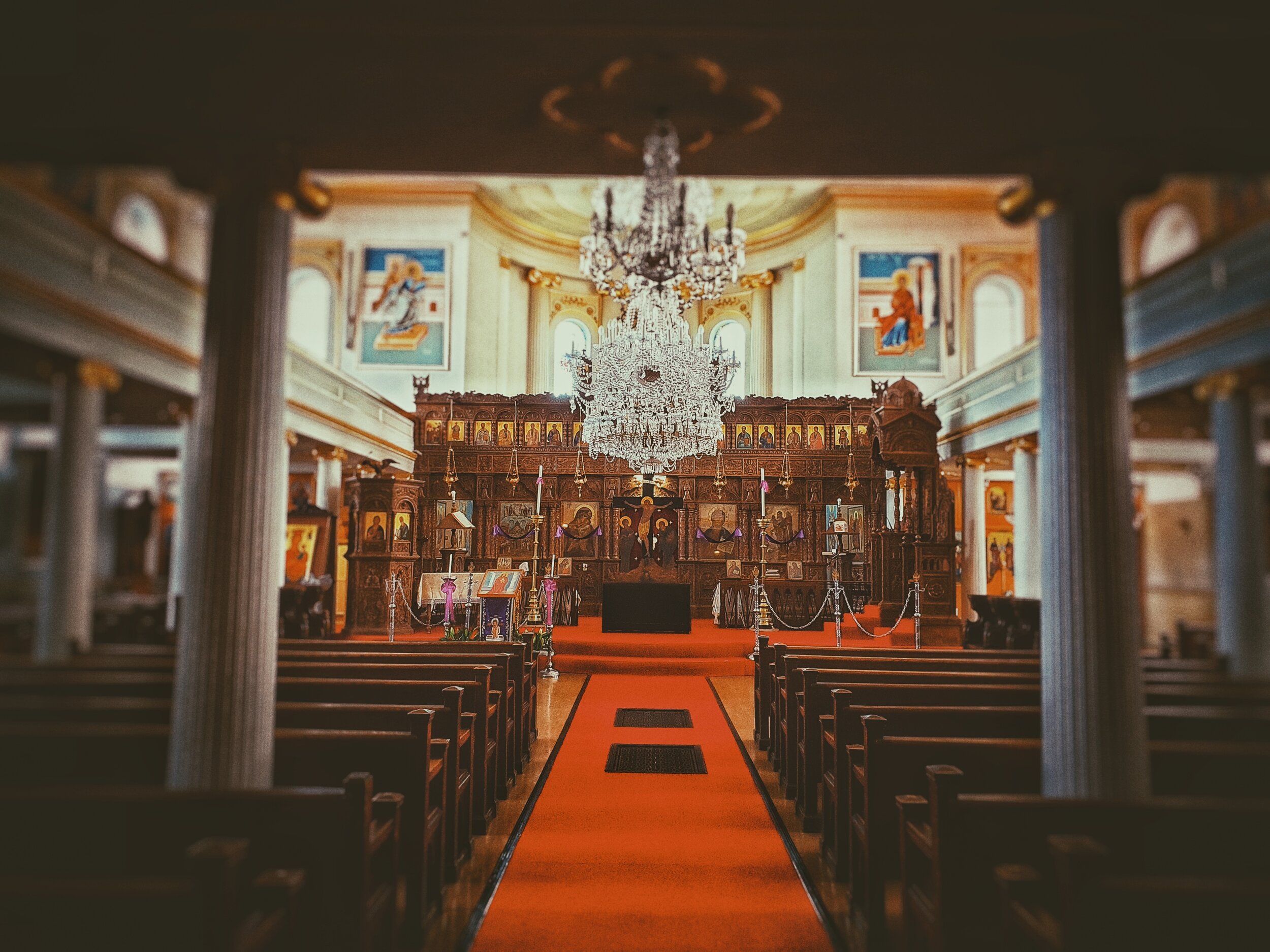
Attend a Service
Regular Services
Every Sunday:
9.30 - 10.45 a.m.: Mattins
10.45 a.m. - 12.45 p.m.: Divine Liturgy
Every Saturday:
4.30 - 5.15 p.m.: Vespers
Other Services:
Arrange your wedding
For the civil wedding: the couple must obtain the licence for marriage, or 'blue papers', from their local registry office six months prior to the wedding date.
For the Orthodox wedding: both the man and woman must produce a Certificate of Freedom from the Church where they were baptised stating that they have not contracted a marriage in the Orthodox Church.
In cases of a mixed marriage, the non-Orthodox member should produce his/her Baptismal Certificate in place of a Certificate of Freedom.
In the case of a second marriage, the person concerned should produce either a Divorce Absolute from the Civil Courts if the previous marriage took place only at the Registry Office, as well as a Divorce Certificate from the Ecclesiastical Court if the previous marriage was solemnised in an Orthodox Church. If the previous spouse has died, then only the Death Certificate need be produced.
All of the above papers for both the civil and religious ceremony should be brought to the church no later than three weeks prior to the wedding date, when the priest will guide the couple through the Orthodox wedding ceremony.
Arranging a Baptism
Arranging a Baptism
Having arranged a date for the ceremony, the parents should bring the birth certificate of the child to the church on the day of the baptism. For the ceremony, the godparent(s) should bring a white baptismal robe, a baptismal cross, a large candle, olive oil, soap, a body towel, and a hand towel.
The godparents must be devout members of the Orthodox Church.
In cases of infant baptism, it is expected that the parents and godparents will provide a Christian Orthodox upbringing and instruction in the faith as the child grows older. It is therefore advisable that the parents and godparents undergo a period of instruction in the Orthodox Faith if they are not already well acquainted with Orthodox teaching.
In cases of adult baptism, the candidate for baptism must first undergo a period of instruction in the Orthodox Faith prior to baptism.
Chrismation
Those who have already received baptism in water in the name of the Trinity outside of the Orthodox Church (e.g. Roman Catholic, Anglican) and who wish to become Orthodox are received by chrismation (anointing with oil). For this ceremony, the godparent/sponsor need bring only a baptismal cross.
As with adult baptism, a period of instruction in the Orthodox Faith prior to chrismation is necessary, and the godparent/sponsor must be Orthodox.
The Feast of All Saints
Clothed as in purple and fine linen with the blood of your Martyrs throughout the world, your Church cries out to you through them, Christ God: Send down your pity on your people; grant peace to your commonwealth, and to our souls your great mercy'. (Apolytikion of All Saints)
All Saints' Day, though not one of the twelve Great Feasts of the Church year, is a significant feast day on which all saints (both known and unknown) are commemorated collectively on the first Sunday after Pentecost.
St Ephrem the Syrian (d. 373) mentions a Feast dedicated to the saints in his writings. St John Chrysostom (d. 407) was the first Christian we know of to assign the Feast to a particular day: the first Sunday after Pentecost. The feast of All Saints achieved great prominence in the ninth century, in the reign of the Byzantine Emperor, Leo VI (886-911). His wife, Empress Theophano lived a devout life. After her death, her husband built a church, intending to dedicate it to her. When he was forbidden to do so, he decided to dedicate it to "All Saints," so that if his wife were in fact one of the saints, she would also be honoured whenever the feast was celebrated. According to tradition, it was Leo who expanded the feast from a commemoration of All Martyrs to a general commemoration of All Saints, whether martyrs or not.
The Sunday following All Saints' Sunday - the second Sunday after Pentecost - is set aside as a commemoration of all locally venerated saints, such as 'All Saints of Britain' or 'All Saints of Mount Athos'. The third Sunday after Pentecost may be observed for even more localized saints, such as "All Saints of London", or for saints of a particular type, such as "New Martyrs of the Turkish Yoke."
With the Feast of All Saints, the season of the Pentecostarion (from Easter through Pentecost to All Saints' Day) comes to an end.


